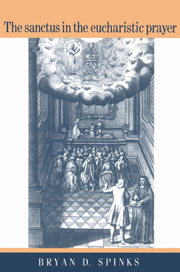Book contents
- Frontmatter
- Contents
- Preface
- List of abbreviations
- Introduction: the enigma of the sanctus
- PART I
- 1 The Old Testament background and setting
- 2 The worship of heaven and the qeduššah in Judaism
- 3 Continuity and influence in early Christian documents
- PART II
- PART III
- Notes
- Bibliography
- Index of modern authors
- Index of eucharistic prayers and liturgical rites
3 - Continuity and influence in early Christian documents
Published online by Cambridge University Press: 26 October 2009
- Frontmatter
- Contents
- Preface
- List of abbreviations
- Introduction: the enigma of the sanctus
- PART I
- 1 The Old Testament background and setting
- 2 The worship of heaven and the qeduššah in Judaism
- 3 Continuity and influence in early Christian documents
- PART II
- PART III
- Notes
- Bibliography
- Index of modern authors
- Index of eucharistic prayers and liturgical rites
Summary
in continuity with Judaism, Christianity inherited the concepts of angelic beings, God enthroned in heaven and, at least in some circles, the idea that the redeemed would be like angels (Lk 20:36; cf.Mk 12:25). It inherited the trisagion through its use of the Book of Isaiah as canonical scripture, and through the various groups which conserved, copied and edited many of the Old Testament Pseudepigrapha. A number of early Christian documents also bear witness to the continuing influence on Christianity of the Jewish liturgical and quasi-liturgical use of the qeduššah.
Within the New Testament it has been claimed by David Flusser that the song sung by the heavenly host in Luke 2:14 is a diminished Greek paraphrase of the Aramaic Targum on Isaiah 6:3 as found in Qeduššah de sidra. Flusser places a great deal of weight upon vague linguistic echoes, and his view is highly speculative. The context in Luke warrants a new song to mark the occasion, not the qeduššah which was the eternal song of the heavenly host. However, even if Flusser's claim is doubtful, there are nevertheless two other New Testament references which indisputably relate to the qeduššah.
Although the text itself is not quoted, Isaiah 6:3 is directly referred to in John 12:41. In explaining why the Jews refused to believe in Jesus despite the many signs he had performed, the evangelist refers to Isaiah 53:1 and 6:10. He then adds:
Isaiah said this because he saw his glory and spoke of him.
- Type
- Chapter
- Information
- The Sanctus in the Eucharistic Prayer , pp. 46 - 54Publisher: Cambridge University PressPrint publication year: 1991



